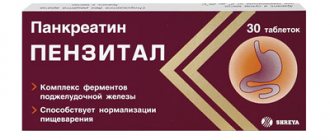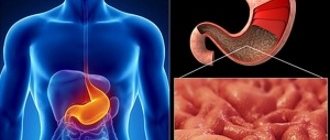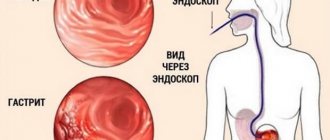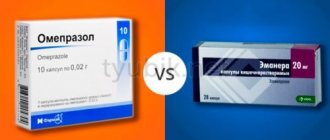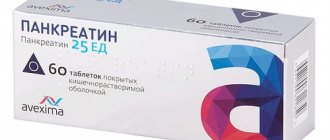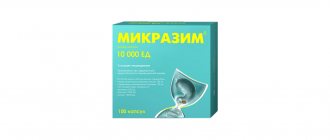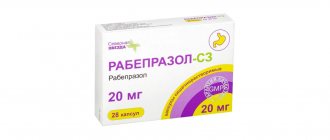Release form, packaging and composition of the drug Clinical-pharmacological group Pharmaco-therapeutic group Pharmacological action Indications for use Method of administration and doses Side effects Contraindications for use Use in children Special instructions Drug interactions
Registration Certificate Holder:
TYUMEN HFZ, FSUE (Russia)
ATX Code:
A09AA02
Active substance:
pancreatin
Dosage form:
Pancreatin-LekT
| The drug is approved for use as an over-the-counter product | Pancreatin-LekT | Enteric-coated tablets reg. No.: LSR-006070/08 dated 07/31/08 - Indefinitely |
Release form and composition
Dosage form – enteric-coated tablets: biconvex, pink or dark pink in color, with a specific odor, without marks; The cross section shows two layers. Packing: blister packs – 10, 15 and 20 pcs., 3, 4 or 6 packs in a cardboard pack; polymer or orange glass jars - 60 pcs., 1 jar in a cardboard pack.
Active ingredient: pancreatin, 1 tablet – 90 mg:
- lipolytic activity – at least 3500 FIP units;
- amylolytic activity – not less than 3500 FIP units;
- proteolytic activity – at least 200 FIP units.
Additional components: polysorbate (Tween-80), copolymer of methacrylic acid with ethyl acrylate, macrogol (polyethylene glycol 6000), titanium dioxide (titanium dioxide pigment grade A), lactose (lactopress), microcrystalline cellulose, lactose monohydrate (milk sugar), talc, calcium stearate, povidone (low molecular weight polyvinylpyrrolidone), azorubine dye (acid red 2C).
Pharmacological properties
Pharmacodynamics
The active component of Pancreatin-LekT - pancreatin - is a substance that compensates for the insufficiency of the exocrine function of the pancreas, having a lipolytic, amylolytic and proteolytic effect.
The enzymes included in the drug (alpha-amylase, chymotrypsin, trypsin, lipase) help break down fats into fatty acids and glycerol, proteins into amino acids, starch into monosaccharides and dextrins.
Trypsin suppresses stimulated pancreatic secretion, due to which it has an analgesic effect.
Pancreatin normalizes digestive processes and improves the functional state of the digestive system.
As part of the drug Pancreatin-LekT, enzymes are protected by a shell from the action of gastric juice, and therefore are released in the alkaline environment of the small intestine.
Maximum enzyme activity after oral administration is observed after 30–45 minutes.
Directions for use and doses
The method of administration and dosage regimen of a particular drug depend on its release form and other factors. The optimal dosage regimen is determined by the doctor. The compliance of the dosage form of a particular drug with the indications for use and dosage regimen should be strictly observed.
The dose (in terms of lipase) depends on age and the degree of pancreatic insufficiency. The average dose for adults is 150,000 units/day. In case of complete insufficiency of exocrine pancreatic function - 400,000 units/day, which corresponds to the daily requirement of an adult for lipase.
Maximum daily dose
is 15,000 units/kg.
Children under 1.5 years old - 50,000 units/day; over 1.5 years - 100,000 units/day.
The duration of treatment can vary from several days (if the digestive process is disrupted due to errors in the diet) to several months and even years (if constant replacement therapy is necessary).
Indications for use
- impaired digestion of food (conditions after resection of the small intestine or stomach);
- errors in nutrition (irregular eating, eating large amounts of food or fatty foods), prolonged immobilization or a sedentary lifestyle, disorders of chewing function - to improve food digestion in people with normal gastrointestinal tract function;
- exocrine pancreatic insufficiency (for replacement therapy): flatulence, dyspepsia, diarrhea of non-infectious origin, pancreatectomy, cystic fibrosis, chronic pancreatitis, Roemheld syndrome (gastrocardiac syndrome), condition after irradiation;
- preparing the patient for ultrasound or x-ray examination of the abdominal organs.
Side effects
Pancreatin-LekT may cause allergic reactions. There are isolated cases of discomfort in the stomach, constipation, diarrhea, and nausea, but the cause-and-effect relationship of their development with the effect of the drug has not been reliably established, since these phenomena can also be signs of exocrine pancreatic insufficiency.
With long-term use of the drug in high doses, there is a possibility of an increase in the level of uric acid in the blood plasma and the development of hyperuricosuria. In children, when taking high doses of pancreatin, irritation of the oral mucosa and perianal irritation may occur; in patients with cystic fibrosis, strictures in the ascending colon and ileocecal region may occur.
Oral tablets Pancreatin-LekT (Pancreatin-LekT)
Instructions for medical use of the drug
Description of pharmacological action
The amylase, lipase and protease included in the drug facilitate the digestion of carbohydrates, fats and proteins, facilitating their more complete absorption in the small intestine.
Indications for use
Digestive insufficiency in violation of the exocrine function of the pancreas: cystic fibrosis, chronic pancreatitis, pancreatectomy, dyspepsia, Roemheld syndrome, flatulence; violation of food absorption (condition after resection of the stomach and small intestine, accelerated passage of food through the intestines, errors in diet when taking fatty, unusual or difficult-to-digest foods, nervousness, etc.), intestinal infections, chronic diseases in the liver and biliary tract, degassing intestines before diagnostic studies (x-ray, ultrasound, etc.).
Release form
Tablets, coated, soluble in the intestine; contour packaging 10 cardboard pack 2; Tablets, coated, soluble in the intestine; polymer jar (jar) 60 cardboard pack 1; Tablets, coated, soluble in the intestine; contour packaging 10 cardboard pack 3; Tablets, coated, soluble in the intestine; contour packaging 10 cardboard pack 6;
Pharmacodynamics
Digestive enzyme agent, replenishes the deficiency of pancreatic enzymes, has proteolytic, amylolytic and lipolytic effects. The pancreatic enzymes included in the composition (lipase, alpha-amylase, trypsin, chymotrypsin) promote the breakdown of proteins into amino acids, fats into glycerol and fatty acids, starch into dextrins and monosaccharides, improves the functional state of the gastrointestinal tract, and normalizes digestive processes. Trypsin suppresses stimulated pancreatic secretion, producing an analgesic effect.
Pharmacokinetics
Pancreatic enzymes are released from the dosage form in the alkaline environment of the small intestine, because protected from the action of gastric juice by the membrane. The maximum enzymatic activity of the drug is observed 30-45 minutes after oral administration.
Use during pregnancy
The safety of use during pregnancy has not been sufficiently studied. Use is possible if the expected effect of therapy exceeds the potential risk to the fetus.
Contraindications for use
Hypersensitivity, acute pancreatitis, exacerbation of chronic pancreatitis.
Side effects
Allergic reactions, rarely - diarrhea or constipation, nausea, discomfort in the epigastric region. With long-term use in high doses - hyperuricosuria; when using high doses in patients with cystic fibrosis - strictures in the ileocecal region and in the ascending colon.
Directions for use and doses
Orally, during or after meals, swallow whole, with plenty of liquid (water, fruit juices). The dose of the drug (in terms of lipase) depends on the age and degree of pancreatic insufficiency. The average dose for adults is 150 thousand units/day; with complete insufficiency of exocrine pancreatic function - 400 thousand units/day, which corresponds to the daily requirement of an adult for lipase. The maximum daily dose is 15-20 thousand units/kg. Children under 1.5 years of age - a daily dose of 50 thousand units; over 1.5 years - 100 thousand units/day. The duration of treatment can vary from several days (for indigestion, errors in diet) to several months and even years (if constant replacement therapy is necessary).
Overdose
Symptoms: hyperuricosuria, hyperuricemia. Children have constipation. Treatment: drug withdrawal, symptomatic therapy.
Interactions with other drugs
Reduces iron absorption (especially with long-term use).
Precautions for use
It is not recommended to exceed the daily dose, especially for patients with cystic fibrosis. With long-term use, iron supplements should be prescribed.
Storage conditions
In a dry place, protected from light, at a temperature below 25 °C.
Best before date
36 months
ATX classification:
A Digestive tract and metabolism
A09 Digestive preparations (including enzyme preparations)
A09A Digestive preparations (including enzyme preparations)
A09AA Enzyme preparations
A09AA02 Multienzymes (lipase, protease etc.)
special instructions
If long-term treatment is necessary, iron supplements should be taken at the same time.
Patients with cystic fibrosis are not recommended to take Pancreatin-LekT in high doses due to the risk of developing fibrous colonopathy (strictures). The dose must be calculated in such a way that it is adequate to the amount of enzymes required for the absorption of fats. In this case, the quality and quantity of food consumed must be taken into account.
Impact on the ability to drive vehicles and complex mechanisms
Pancreatin-LekT does not affect the ability to concentrate attention and the speed of psychomotor reactions.
Similar drugs:
- Panzynorm 10000 Capsule
- Pangrol 10000 Capsule
- Kreon Capsule
- Pancreatin forte Oral tablets
- Pancreasim Oral tablets
- Ermytal Capsule
- Kreon Capsule
- Mezim 20000 (Mezym 20000) Oral tablets
- Pangrol 25000 Capsule
- Mezim forte Oral tablets
** The Drug Directory is intended for informational purposes only. For more complete information, please refer to the manufacturer's instructions. Do not self-medicate; Before starting to use the drug Pancreatin-LekT, you should consult a doctor. EUROLAB is not responsible for the consequences caused by the use of information posted on the portal. Any information on the site does not replace medical advice and cannot serve as a guarantee of the positive effect of the drug.
Are you interested in the drug Pancreatin-LekT? Do you want to know more detailed information or do you need a doctor's examination? Or do you need an inspection? You can make an appointment with a doctor - the Euro lab is always at your service! The best doctors will examine you, advise you, provide the necessary assistance and make a diagnosis. You can also call a doctor at home . Euro lab clinic is open for you around the clock.
** Attention! The information presented in this medication guide is intended for medical professionals and should not be used as a basis for self-medication. The description of the drug Pancreatin-LekT is provided for informational purposes and is not intended for prescribing treatment without the participation of a doctor. Patients need to consult a specialist!
If you are interested in any other drugs and medications, their descriptions and instructions for use, information about the composition and form of release, indications for use and side effects, methods of use, prices and reviews of drugs, or you have any other questions and suggestions - write to us, we will definitely try to help you.
